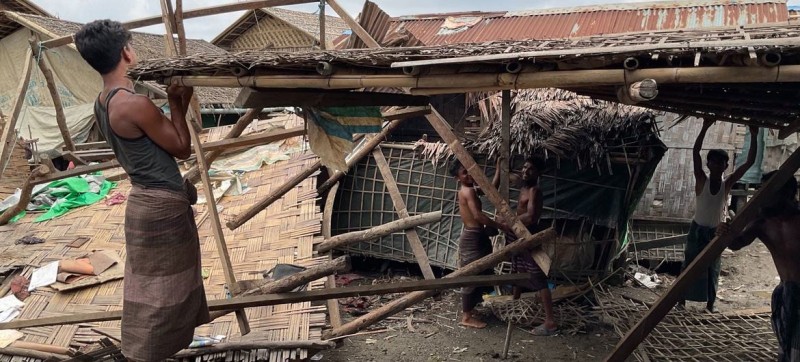© UNOCHA/Pierre Lorioux Men repair a shelter damaged by Cyclone Mocha in Nget Chaung 2 IDP camp in Rakhine state in Myanmar.
In Myanmar, the UN appealed on Tuesday for $333 million to assist 1.6 million of the most vulnerable people, many of whom have lost their homes as the cyclone hit the west of the country over a week ago.
The UN’s top aid official in the country, Ramanathan Balakrishnan, told reporters in Geneva that the disaster had left hundreds of thousands without a roof over their heads as the monsoon looms.
Among the priorities is providing people with safe shelter and preventing the outbreak and spread of water-borne diseases.
Tweet URL
1.6 million in Myanmar in need of aid
With coastal winds recorded at up to 250 kilometres per hour making landfall off the Bay of Bengal on 14 May, Mocha brought flooding and landslides to an area that is home to hundreds of thousands already displaced by the protracted conflict in Myanmar, many of them the Rohingya minority of Rakhine state.
The UN appeal requests an “urgent injection” of funds to support those in the highest impact zone across Rakhine, Chin, Magway, Sagaing and Kachin states.
Speaking via Zoom from Yangon, Mr. Balakrishnan, who is the UN Resident and Humanitarian Coordinator for Myanmar, said that the 1.6 million people identified for support under the new funding appeal include “people who have lost their homes, people who lack access to health services and clean water, people who are food insecure or malnourished, displaced people in camps, stateless people, women, children and people with disabilities”.
Rebuilding before the monsoon
Mr. Balakrishnan warned that “those affected are facing a long, miserable monsoon season if we cannot mobilize resources in time”.
He also gave reporters a glimpse of the harsh conditions facing internally displaced people, or IDPs, in the capital of Myanmar’s Rakhine State, Sittwe.
He recounted that an IDP from a camp in Sittwe told his colleagues that his shelter was destroyed while his family took refuge at an evacuation site at the height of the storm.
“Those who stayed had faced a horrible experience as the camp was submerged in water from the storm surge,” the UN aid official said, before insisting on the need for medical care, clean water and food, as well as support to rebuild shelters.

© UNOCHA/Pierre Lorioux A shelter is left in pieces by Cyclone Mocha in Nget Chaung 2 IDP camp in Rakhine state in Myanmar.
Humanitarian response underway
Hundreds of humanitarian personnel are on the ground in Rakhine state, already providing food aid, shelter, water and hygiene items “wherever they have access”, while mobile health teams have been supporting people on the ground, Mr. Balakrishnan said, with plans for additional urgent aid distribution.
“Thousands of people have already received support and we are hoping to soon receive the green light for a two-week distribution plan… across all affected communities in Rakhine and Chin”, he announced.
Rohingya refugees hit in Bangladesh
In neighbouring Bangladesh, the UN is appealing for $42 million to support the cyclone response, including $36 million for Rohingya refugees living in camps in the affected areas.
Gwyn Lewis, UN Resident Coordinator in Bangladesh speaking from Dhaka, told reporters that more than 400,000 people in the country were impacted and 40,000 Rohingya refugees living in camps saw their homes – most often temporary bamboo structures – destroyed or damaged.
More food ration cuts
Ms. Lewis stressed that the cyclone came on the heels of food ration cuts for refugees and a devastating fire in March, in which 16,000 had lost their homes.
Adding to the refugees’ hardship, she said that lack of funding is forcing the UN to cut their food rations for a second time as of 1 June. “This means that the Rohingya refugees will receive only 67 per cent of the needed food rations, so one million people will only be getting about two-thirds of the needed food,” she added.
Life-saving early warnings
Thankfully, the Government of Bangladesh acted quickly upon the cyclone warnings, Ms. Lewis said, and evacuated some 700,000 people from Mocha’s path, which helped save countless lives.
She expressed hope that new funding will allow to rebuild the homes of the Rohingya refugees living in camps in Bangladesh with more weather-resistant materials and improve resilience.
On Monday, the World Meteorological Organization (WMO) stressed the power of early warning services in preventing the worst impacts of extreme weather. The agency said that in the past, weather disasters similar to Mocha had caused “death tolls of tens and even hundreds of thousands” in both Myanmar and Bangladesh.
WMO also reported that over the past 50 years, Asia saw the highest death toll due to extreme weather, climate and water-related events, with close to one million deaths – more than half in Bangladesh alone.




Comments are closed.